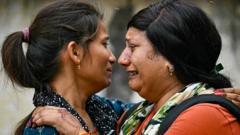In the wake of the catastrophic Air India crash in Ahmedabad, families of the victims are struggling to cope with their loss while desperately searching for answers. Imtiyaz Ali Sayed, who lost his brother Javed, his wife, and two children in the disaster, stands vigil at the hospital, determined to see his brother's body, no matter how painful the reality may be. The tragedy occurred shortly after the Boeing 787-8 Dreamliner took off, resulting in a crash that took the lives of 241 individuals on board, with only one survivor.
Overnight, the air outside the hospital was thick with despair as families flocked to the site, hoping to find solace in the familiar faces of their loved ones, only to be met with the stark cruelty of fate. Imtiyaz scrolls through his phone, clutching recent photos of his niece and nephew, reminiscing about the joy they brought him. "You don't understand. They were my life - if I give up now, I might never be able to recover," he expresses, looking skyward for confirmation of their existence, even as he wrestles with the collapse of his world.
Witnesses describe a harrowing scene as the flight took to the skies, only to meet a catastrophic failure moments later. In a densely populated area, the plane transformed into a fireball, crashing into a medical college and claiming additional lives on the ground. Survivor accounts recount the deafening roar as the aircraft descended, while bystanders were paralyzed by fear and disbelief.
Authorities are engaged in a painstaking effort to identify the victims, but the condition of many bodies complicates the task. As DNA testing begins, families like the Shaikhs face an agonizing wait for answers. Sameer Shaikh, who lost his son Irfan, was confronted with the grim reality of his son's fate without prior notice. "How can we wait three days when we know it's our son?" he laments, questioning the limits of human patience when faced with trauma.
Amid the grief, another tragedy unfolds nearby. At BJ Medical College, where the plane crashed, Payal Thakur desperately searches for her mother, Sarla, who was cooking in the hostel at the time of impact. With each unanswered inquiry, the specter of uncertainty looms large, further compounding the pain of those impacted by this calamity.
Across the campus, witnesses recount the pandemonium that ensued as students and staff fled for safety, joining the ranks of the afflicted. As smoke enveloped the area, bags and meals were left abandoned, echoing the suddenness of life turned chaotic in mere moments.
As emergency services continue to process this unimaginable tragedy, the sense of loss permeates the atmosphere. The lives of many have been irreparably altered, their futures entwined with the memories of those who perished. "It's like trying to tell ashes apart from ashes," said an anonymous volunteer at the hospital, emphasizing the immense emotional toll felt by families, now left searching for solace and the only closure they can hope to find in their darkest moments.
Overnight, the air outside the hospital was thick with despair as families flocked to the site, hoping to find solace in the familiar faces of their loved ones, only to be met with the stark cruelty of fate. Imtiyaz scrolls through his phone, clutching recent photos of his niece and nephew, reminiscing about the joy they brought him. "You don't understand. They were my life - if I give up now, I might never be able to recover," he expresses, looking skyward for confirmation of their existence, even as he wrestles with the collapse of his world.
Witnesses describe a harrowing scene as the flight took to the skies, only to meet a catastrophic failure moments later. In a densely populated area, the plane transformed into a fireball, crashing into a medical college and claiming additional lives on the ground. Survivor accounts recount the deafening roar as the aircraft descended, while bystanders were paralyzed by fear and disbelief.
Authorities are engaged in a painstaking effort to identify the victims, but the condition of many bodies complicates the task. As DNA testing begins, families like the Shaikhs face an agonizing wait for answers. Sameer Shaikh, who lost his son Irfan, was confronted with the grim reality of his son's fate without prior notice. "How can we wait three days when we know it's our son?" he laments, questioning the limits of human patience when faced with trauma.
Amid the grief, another tragedy unfolds nearby. At BJ Medical College, where the plane crashed, Payal Thakur desperately searches for her mother, Sarla, who was cooking in the hostel at the time of impact. With each unanswered inquiry, the specter of uncertainty looms large, further compounding the pain of those impacted by this calamity.
Across the campus, witnesses recount the pandemonium that ensued as students and staff fled for safety, joining the ranks of the afflicted. As smoke enveloped the area, bags and meals were left abandoned, echoing the suddenness of life turned chaotic in mere moments.
As emergency services continue to process this unimaginable tragedy, the sense of loss permeates the atmosphere. The lives of many have been irreparably altered, their futures entwined with the memories of those who perished. "It's like trying to tell ashes apart from ashes," said an anonymous volunteer at the hospital, emphasizing the immense emotional toll felt by families, now left searching for solace and the only closure they can hope to find in their darkest moments.



















